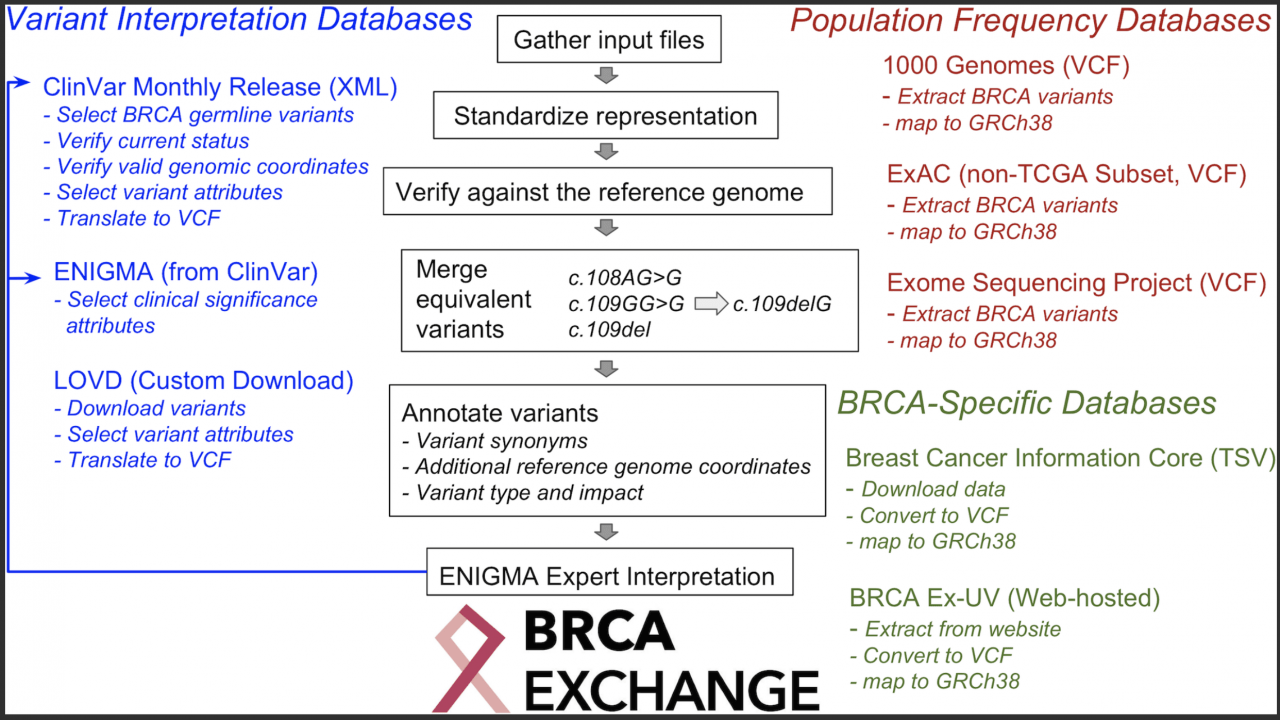UC Santa Cruz Genomics Institute helps develop BRCA Exchange to inform understanding of cancer risk by aggregating data on thousands of BRCA1 and BRCA2 variants
SANTA CRUZ, CA – January 8, 2019 Researchers at the UC Santa Cruz Genomics Institute have helped develop a global resource that includes data on thousands of inherited variants in the BRCA1 and BRCA2 genes. The BRCA Exchange was created through the BRCA Challenge, a long-term demonstration project initiated by the Global Alliance for Genomics and Health (GA4GH) to enhance sharing of BRCA1/BRCA2 data. The resource, available through a website and a new smartphone app, allows clinicians to review expert classifications of variants in these major cancer predisposition genes as part of their individual assessment of complex questions related to cancer prevention, screening, and intervention for high-risk patients.
A paper detailing the development of the BRCA Exchange was published January 8,
“Sharing genetic data is very challenging, due to a number of regulatory, legal and ethical restrictions, explained researcher and BRCA Exchange project lead Melissa Cline, Ph.D. “At the same time, it is necessary because “rare” genetic variants are actually collectively common,” Cline continued.
In fact, one recent study (Karczewski, The ExAC browser, Nucleic Acids 2017) showed that the average human exome carries upwards of seven highly rare genetic variants. Many of these variants will be inconsequential, but a few will fall into clinically important genes such as BRCA1, and no single institution will gather enough data on these variants for robust clinical interpretation.
Recognizing this, the Global Alliance for Genomics and Health (GA4GH) launched a project called BRCA Challenge, to bring together leading experts to address these challenges for BRCA1 and 2 as a model for other genes. The BRCA team produced a web site, brcaexchange.org
The consortium brings together some of the world’s leading scientists, science policy scholars, legal scholars and others, all
“This project has yielded a meta-analysis of BRCA1 and BRCA2 variants collected from multiple sources to understand how experts annotate specific variants in the two genes,” said Stephen J. Chanock, M.D., director of NCI’s Division of Cancer Epidemiology and Genetics and lead author of the paper. “There’s an urgent need for sharing data in cancer predisposition research. The BRCA Exchange is proof-of-principle that large-scale collaboration and data sharing can be achieved and can provide the latest and best quality information to enable clinicians and individuals to improve care.”
Certain inherited variants in BRCA1 and BRCA2 can increase the risk of breast, ovarian, and other cancers by varying degrees, whereas other variants are not associated with
The BRCA Exchange dataset comprises information from existing clinical databases—Breast Cancer Information Core, ClinVar, and the Leiden Open Variation Database—as well as population databases and data from clinicians, clinical laboratories, and researchers worldwide. It currently includes more than 20,000 unique BRCA1 and BRCA2 variants. More than 7,200 variants in the database have been classified by an expert panel, the Evidence-based Network for the Interpretation of Germline Mutant Alleles (ENIGMA), and approximately 4,800 of these variants are known to cause disease. The BRCA Exchange pools variants from data resources worldwide, which should lead to
With a single-point-of-access website (www.brcaexchange.org), the BRCA Exchange provides information on these gene variants to clinicians, researchers, data scientists, patients, and patient advocates. It also serves as a demonstration project showing that this kind of comprehensive data sharing—requiring collaboration across hundreds of organizations, the establishment of an infrastructure to house the information, and the development of data-sharing protocols—is possible for other cancer predisposition genes and, indeed, for genes associated with other diseases.
Next steps for the project include collaboration with additional global data generators and data holders, continued technical development, and increased engagement with patients and patient advocates around the world.
###
About Us
About the UC Santa Cruz Genomics Institute
Comprising diverse researchers from a variety of disciplines across academic divisions, the UC Santa Cruz Genomics Institute leads UC Santa Cruz’s efforts to unlock the world’s genomic data and accelerate breakthroughs in health and evolutionary biology. Our platforms,
About our Home at UCSC
About the Baskin School of Engineering
Home to the UC Santa Cruz Genomics Institute, the Baskin School of Engineering at UC Santa Cruz offers unique opportunities for education, research
About the BRCA Exchange
The UC Santa Cruz Genomics Institute co-founded the BRCA Exchange, a global open source resource governed by the Global Alliance for Genomics and Health (GA4GH). This network hosts clinical breast-cancer data contributed by geneticists from several
|
For Immediate Release January 8, 2019 12 noon PST |
Contact: Alexis Morgan (831) 459-4046 amorgan1@ucsc.edu |
